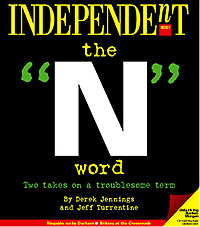The Infamous “N-word”
Observations on vocabulary in a politically correct age.

The Simpson trial reached its peak of absurdity when the “N-word” became more important than the defendant’s guilt or innocence. As the trial closed, OJ’s clever attorneys succeeded in making a policeman’s vocabulary a more important issue than whether or not Simpson had killed two people.
In recent weeks two members of the Dallas School Board have come under fire for using the “N-word.” The first, a white male, was forced to resign by public indignation when illegal wiretaps of his telephone conversations showed that he regularly used the “N-word.” The second, a black female, is still considering her future on the Board. She, too, became a focus of fury when illegal wiretaps revealed that she used the “N-word” in speaking of her own people. One of the black leaders calling for her resignation freely admitted that blacks often use the “N-word” in referring to each other, but he said that did not justify a public official using the term.
Historical Terms
Meanwhile, minority and liberal groups across the country continue their attempts to ban from both public and school libraries the writings of America’ greatest 19th Century novelist, Mark Twain. After all, one of the heroes of his novel, Huckleberry Finn, is none other than “Nigger Jim.” Twain’s critics ignore the fact that his use of the word simply reflected the reality of the vocabulary of that time (the mid-1800’s) and was not meant in any pejorative manner.
Keep in mind that it was not very long ago when the acceptable and polite way to refer to a black person was to use the term “colored.” The term was incorporated by blacks themselves into the title of their national civil rights organization: “The National Association for the Advancement of Colored People” (The NAACP). Yet, with the passage of time, the term, “colored,” has come to have a negative connotation. Are we now to go back and condemn as “racist” all novels written between 1900 and 1950 which used the term “colored” to refer to black people?
Words change their meaning over time, and for that reason, I don’t approve of the “N-word” because it is plainly a derogatory word since the setting of the ’90’s. Christians need to be careful about their language, avoiding ethnic and racial slurs that convey a negative image that degrades human dignity — terms like kike, spic, polock, greaser, and nigger.
Questionably “Correct” Terms
I must confess, however, that I have real difficulty with some of the labels that groups have selected for themselves and then demand that others use in referring to them. For example, I strongly object to the term, “Native American,” which American Indians have adopted for themselves in recent years. The term is a politically loaded one that implies that those who are not Indians are not native Americans. That is nonsense. I am not an Indian, but I am a native American.
Another example of politically correct language that I object to is the term “Afro-American.” I refuse to use it because I believe it is destructive to society for us to use such nationalistic terms to identify ourselves. The use of such terms is balkanizing our country. My heritage is Irish, but I do not desire to be called an “Irish-American.” I am simply an American.
Another term I refuse to incorporate into my vocabulary is the word “gay” as a descriptive term for a homosexual or lesbian person. To me it is a real perversion of language to call a lifestyle “gay” that is unnatural, perverse, and ungodly.
When I was growing up such persons were called “queers.” That is now considered to be a derogatory term (although the radical homosexuals use it to refer to themselves — in fact, one of their organizations is called “Queer Nation”). I prefer to use the biblical term, “Sodomites.” They don’t like that term because they consider it judgmental, but so be it, for they are under the judgment of God, and they need to be reminded of that grim reality.
By the same token, I am not going to refer to a thief as “a greed-challenged person.” Some forms of behavior need to be called by their correct names regardless of how derogatory those names may be. A rapist is a rapist. There is a difference in speaking disparagingly of a person’s race or color and speaking negatively about their behavior. They can control their behavior.
Blasphemous Terms
There are words I am far more concerned about than the “N-word” and all of its corollaries. I am much more concerned about the “G-word” and the “J-word.” I am always amazed by the fact that those who protest the “N-word” the loudest think nothing of abusing the name of God or the name of Jesus. Blasphemy has become a national sport in America. The wiretapped conversations of the white school board member in Dallas were full of blasphemies. Did anyone object to such filthy and vile language? No, the public outcry was provoked only by the use of the “N-word.”
Even Christians who would never think of using their God’s name in vain have become desensitized to the use of blasphemy by others. Consider, for example, how professing Christians will sit through movies in which the name of their Savior is blasphemed over and over again. Even worse, they recommend such movies to their friends!
A Paradoxical Term
One revealing thing about blasphemy that I have noticed is that the name of Jesus is used as a curse word in almost every major language in the world. Have you ever stopped to think why that is so? Why wouldn’t people use instead the name of Judas or Hitler or Nero? Why Jesus?
I can think of only one reason — it is a supernatural phenomenon. Satan puts the blasphemy of Jesus on the lips of all nations because he knows that Jesus was God in the flesh. What this means is that, paradoxically, the universal use of Jesus’ name as a curse word is a testimony to His divinity.
The “C Term”
I’d like to close these observations by returning to the “N-word.” I recently saw a black teenager at a local mall who was wearing a very interesting tee-shirt. I don’t know what it had printed on the front, but on the back it said:
“I’m not a Negro
I’m not a Black
I’m not an Afro-American
I’m a child of God saved by grace”
That’s where we all need to find our true identities — in the “C-term,” as “Children of God.”




